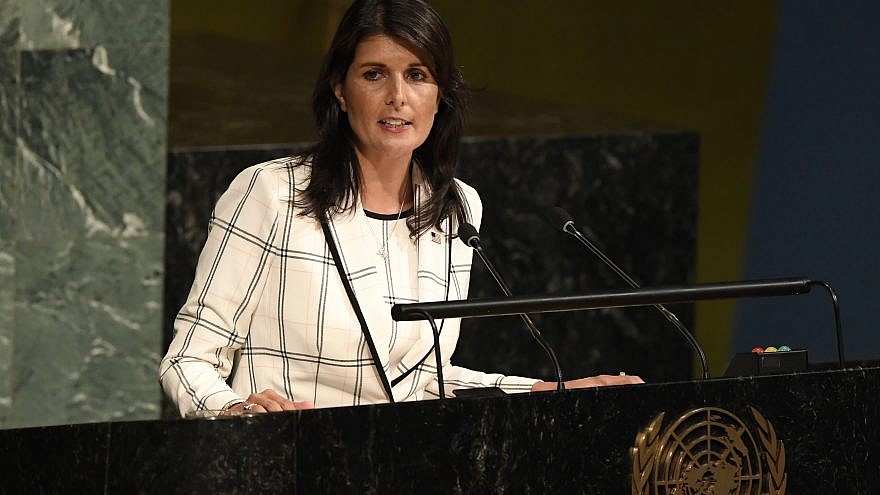U.S. Ambassador to the United Nations Nikki Haley announced on Tuesday that the United States is pulling out of the U.N. Human Rights Council, citing the world body’s “chronic” bias against Israel as one of the primary factors for the withdrawal.
“For too long, the human-rights council has been a protector of human-rights abusers and a cesspool of political bias,” Haley said in announcing the withdrawal. “Regrettably, it is now clear that our call for reform was not heeded.”
Israeli Ambassador to the United Nations Danny Danon welcomed the decision by Haley, saying that the United States “has proven, yet again, its commitment to truth and justice and their unwillingness to allow the blind hatred of Israel in international institutions to stand unchallenged.”
“The Human Rights Council has long been the foe of those who truly care about human rights around the world,” Danon said in a statement following Haley’s announcement. “We thank President Donald Trump, Secretary of State Mike Pompeo and Ambassador Nikki Haley for their leadership and call on the moral majority at the U.N. to hold all of its institutions accountable.”
Israel is the only country with a dedicated item at the UNHRC, known as Agenda Item 7, which mandates a discussion of Israel’s conduct with the Palestinians at every session. Agenda Item 7 is currently set for debate beginning on July 2.
During its last session in March, the UNHRC passed five resolutions condemning Israel. The UNHRC has also mandated the compiling of a “blacklist” of companies that do business with Israeli entities over the pre-1967 lines.
Ahead of the announcement, U.S. officials said that the Trump administration had concluded that efforts to institute reform in the UNHRC had failed, and that withdrawal was the only option to demonstration its seriousness.
Currently, there are 47 countries in the UNHRC, which was elected by the U.N. General Assembly with a specific number of seats for its region. The U.S. term on the UNHRC was scheduled to end next year when it was slated to go back to being an observer country. As an observer, the United States can speak out on human-rights abuses, but cannot vote.
Israel, which has an ambassador the presides over U.N. bodies in Geneva, has never been one of the 47 members of the council.
Israel’s Deputy Minister for Diplomacy and former Israeli Ambassador to the United States Michael Oren also welcomed Americas decision.
“This is a welcomed response to a body that condemned Israel more than all other countries combined. The U.S. now signals its refusal to lend legitimacy to U.N. bias against Israel and Jews,” Oren wrote on Twitter.
The U.S. isn’t the only world power to express concern over Israel’s treatment. On Monday, British Foreign Secretary Boris Johnson called on the UNHRC to reform.
“We share the view that the dedicated Agenda Item 7 focused solely on Israel and the Occupied Palestinian Territories is disproportionate and damaging to the cause of peace, and unless things change, we shall vote next year against all resolutions introduced under Item 7,” Johnson told the council at the beginning of its three-week session.


























